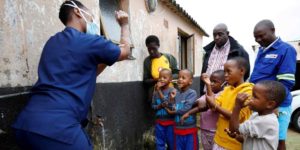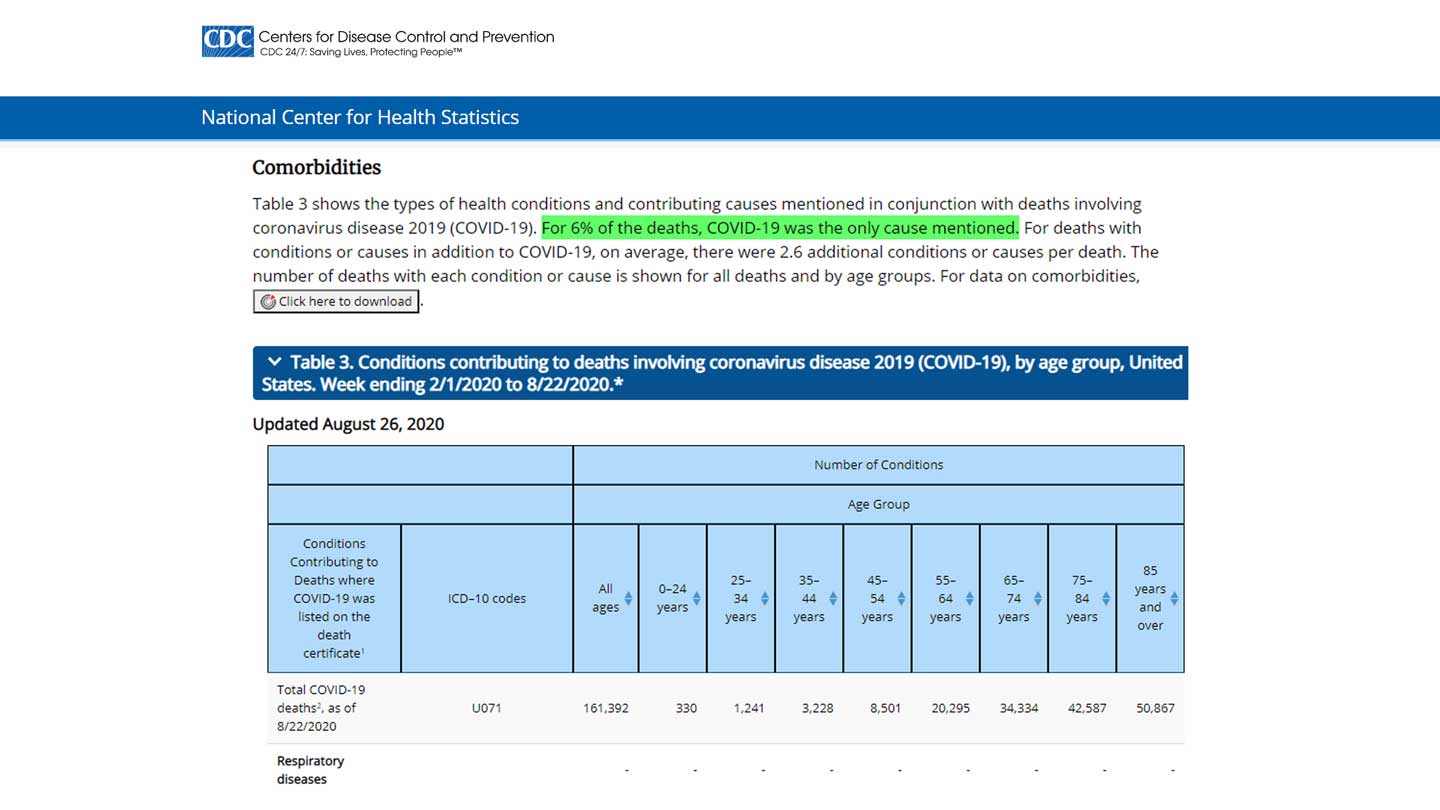Shocking Conclusions from Africa Study Expose Why Big Pharma’s Puppets are Suppressing Ivermectin Data
The vaccine-nannies are busy saying Ivermectin doesn’t work, but they don’t look to the science to show this. They simply gaslight us about the “horse dewormer.”

Photo: Courtesy of JD Rucker, noqreport.com
Originally posted on noqreport.com by JD Rucker, September 3, 2021
Joe Rogan, Kirstie Alley, and a handful of other celebrities have brought out the anti-Ivermectin wolves in America. Mainstream media is in full attack-mode. Big Tech is censoring posts to the point that people are coming up with creative ways to indicate they’re even talking about Ivermectin so as not to trigger the filters. The CDC claimed the drug was for horses only, neglecting to remove their own recommendations for people to take Ivermectin for other issues.
If the CDC is recommending what they deemed to be a “horse dewormer” to people traveling from Africa, does that mean the CDC is racist?
A graph made its rounds on social media yesterday that raised some eyebrows. It showed the clear difference between countries in Africa that use Ivermectin regularly versus those that do not. The differences were startling as the Ivermectin-nations showed unambiguous advantages against Covid-19. The mortality rates were very low compared to countries that do not use Ivermectin on a wide scale.
This graph prompted me to dig deeper into the study. As it turned out, the graph is the tip of the iceberg. There are other data points supporting the use of Ivermectin as a treatment for Covid-19 scattered throughout the study. I’ll publish the whole thing below, but here are some important takeaways for easy digestion.
First, the countries that use Ivermectin have less-sophisticated medical facilities than the nations that do not use Ivermectin. This means that life expectancy is lower and testing is more sporadic. Universal Ivermectin use seems to be the only factor preventing these nations from a full-blown Covid-19 catastrophe.
Second, Africa seems to be the perfect environment for this type of study because of the stark differences in mortality rates. Nations that push Ivermectin as an antiparasitic agent were not attempting to fight Covid-19. They’ve been using the drug universally for years. Therefore, the data regarding mortality clearly delineates between Ivermectin nations and non-Ivermectin nations. As the study states, “The community-directed onchocerciasis treatment with ivermectin is the most reasonable explanation for the decrease in morbidity and fatality rate in Africa.”
The final and arguably most important “hidden” takeaway from the study is that recovery and fatality rates for Covid-19 cases were not statistically significantly different between Ivermectin countries and non-Ivermectin countries. That means that once a person was tested and officially declared a Covid-19 case, they recovered or died at essentially the same rates across the board.
This tells us that other factors such as medical proficiency, environmental differences, or access to vaccines do not contribute to whether someone lives or dies once they have become sick with the disease. Since overall mortality rates per capita are significantly lower in Ivermectin nations but case fatality rates are the same, Ivermectin is clearly effective as an early treatment and perhaps even as a preventative measure.
Remember, the people in the Ivermectin nations are already taking the drug. They aren’t waiting for a positive Covid test and likely aren’t even very concerned about the disease at all. Many if not most who do end up becoming Covid-19 cases in Ivermectin nations were likely among those who were not taking Ivermectin as an antiparasitic. This is why they’re on equal footing when they go to the hospital as those living in non-Ivermectin nations.
Here is the study. Below it, I will offer some commentary on what this all means for America and the rest of the world.
Why COVID-19 is not so spread in Africa: How does Ivermectin affect it?
Hisaya Tanioka, Sayaka Tanioka, Kimitaka Kaga
Abstract
Background Scientists have so far been unable to determine the reason for the low number of COVID-19 cases in Africa.
Objective To evaluate the impact of ivermectin interventions for onchocerciasis on the morbidity, mortality, recovery, and fatality rates caused by COVID-19.
Method A retrospective statistical analysis study of the impact of ivermectin against COVID-19 between the 31 onchocerciasis-endemic countries using the community-directed treatment with ivermectin (CDTI) and the non-endemic 22 countries in Africa. The morbidity, mortality, recovery rate, and fatality rate caused by COVID-19 were calculated from the WHO situation report in Africa. We investigated the onchocerciasis endemic 31 countries and the non-endemic 22 countries. Statistical comparisons used by the Welch test of them in the two groups were made.
Results The morbidity and mortality were statistically significantly less in the 31 countries using CDTI. The recovery and fatality rates were not statistically significant difference. The average life expectancy was statistically significantly higher in the non-endemic countries.
Conclusions The morbidity and mortality in the onchocerciasis endemic countries are lesser than those in the non-endemic ones. The community-directed onchocerciasis treatment with ivermectin is the most reasonable explanation for the decrease in morbidity and fatality rate in Africa. In areas where ivermectin is distributed to and used by the entire population, it leads to a significant reduction in mortality.
Introduction
At least for now, it seems that Africa will be in completely different situations under the coronavirus infections. Some scientists have cited a higher proportion of young people [1,2], a warmer climate [3], and widespread BCG vaccination [4] as possible factors. While these are positive theories, they do not provide scientific evidence to explain why the spread of new coronavirus infections in Africa appears to be at a slower pace than in other parts of the world.
In the meantime, based on a growing data of recently reported data on a large number of published and unpublished trials, it is suggested that ivermectin being a well-known antiparasitic agent with antiviral activity and anti-inflammatory effects, has activity against SARS-CoV-2 [5]. On the other hand, ivermectin has been administered in Africa for onchocerciasis under the WHO strategy. In 2012, WHO’s neglected tropical diseases (NTD) Roadmap set a goal of elimination where feasible by 2020, and the African Programme for Onchocerciasis Control advanced the goal to elimination in 80% of countries by 2025 [6].
The community-directed treatment with ivermectin (CDTI) is the basic strategy to eradicate onchocerciasis in Africa. More than 99% of the infections have occurred in the 31 countries in Sub-Saharan Africa listed below: Angola, Benin, Burkina Faso, Burundi, Cameroon, Central Africa, Chad, Republic of Congo, Cote d’Ivoire, Democratic Republic of Congo, Equatorial Guinea, Ethiopia, Gabon, Ghana, Guinea, Guinea-Bissau, Kenya, Liberia, Malawi, Mali, Mozambique, Niger Nigeria, Rwanda, Senegal, Sierra Leone, South Sudan, Sudan, Togo, Uganda, Tanzania. In the rural populations of sub-Saharan Africa where health systems are weak and under-resourced, the community-directed treatment strategy is proving to be one of Africa’s most successful in reducing disease at low cost [7].
If ivermectin has an antiviral effect on SARS-CoV-2, the morbidity, mortality, recovery, and fatality rates caused by COVID-19 would be reduced in the community-directed treatment with ivermectin (CDTI) countries compared to non-endemic untreated ones. Therefore, epidemiological analyzes of the two groups are necessary. These results will validate the effect of ivermectin intervention on COVID-19. This study aims to evaluate the impact of ivermectin interventions for onchocerciasis on morbidity, mortality, recovery rate, and fatality rate caused by COVID-19.
Materials
We divided into two group countries. One was 31 onchocerciasis-endemic countries (Ivermectin group) using the community-directed treatment with ivermectin (CDTI), and the other was 22 non-endemic countries (non-Ivermectin group). Each population and average life expectancy were obtained from the WHO Africa statics in 2019 [8]. The COVID-19 data was obtained from the WHO coronavirus disease Dashboard on January 15, 2021, and the COVID-19 Situation update for the WHO African Region [9]. Each morbidity, mortality, recovery rate, and fatality rate caused by COVID-19 were calculated from the collected data.
Table 1 showed the population (in millions), morbidity (number of cases and per million population), mortality (number of deaths and per million population), recovery rate (number of cases and percentage), and fatality rate (percentage) in the onchocerciasis-endemic 31 countries. Table 2 showed them in the non-endemic 22 countries.



Analytical method
This study aimed to verify the ivermectin intervention statistics in the community-directed treatment with ivermectin. Therefore, we compare the morbidity, mortality, recovery rate, and fatality rate caused by COVID-19 between the two group countries.
Statistical Analysis
Statistical analysis was done by Microsoft Excel 2016 (Microsoft Corporation Redmond, Washington). Data were presented as a mean and standard deviation (SD) and compared between the two groups utilizing Welch-test. A two-sided P value < 0.05 was considered significant.
Results
The results of the onchocerciasis-endemic of 31 countries (Ivermectin group) and the non-endemic 22 countries (non-Ivermectin group) were shown in Table 3.

Morbidity and mortality were statistically significantly less in the ivermectin group. The population, recovery rate, and fatality rate were not statistically significant differences between them. The average life expectancy was statistically significantly high in the non-ivermectin group.
Discussion
It is important to verify the effect of ivermectin interventions on the variations in morbidity and mortality and the associated viral lethality. Ivermectin is an approved antiparasitic drug that is used to treat several neglected tropical diseases, including onchocerciasis, helminthiases, and scabies. For these indications, ivermectin has been widely used and has demonstrated an excellent safety profile [10].
This epidemiological study in Africa reveals that the morbidity and mortality in the onchocerciasis-endemic countries (Ivermectin group) are statistically lesser than those in the non-endemic ones (non-Ivermectin group). However, the morbidity will depend on the number of COVID-19 tests. Onchocerciasis-endemic countries are mainly in the medically weak areas in Sub-Saharan Africa rather than the non-endemic countries. Therefore, the average life is statistically different between the two groups. And, we suggest that the number of COVID-19 tests in the endemic-countries will be lesser than the non-endemic ones because their health systems are under-resourced.
In other words, the apparent incidence of COVID-19 may be lower in the onchocerciasis-endemic countries, but mortality is unrelated to the number of tests. The mortality is less in the ivermectin group than the non-ivermectin one. The recovery and fatality rates are statistically the same in both groups, although they will depend on the medical circumstances. That is, is the medical situation not that different between the two group countries, or is there another factor at play?
Some researchers say that the short life expectancy and the fact that 3% of the population is over 65 years old may be a reason for COVID-19 not exploding infections in Africa [1, 2]. The mean age of the average life expectancy in epidemic countries is 60.7 years and 66.4 years in non-epidemic countries. However, countries with shorter average life expectancy have worse medical circumstances than countries with longer average life expectancy. As a result, the epidemic countries have higher infant mortality and lower average life expectancy [8]. And more, if this difference is one of the factors in the impact, the statistically no difference in the recovery rate and fatality rate between the two groups shows a discrepancy.
Taking this into account, mortality is lower in ivermectin-treated countries than those in non-treated ones. The recovery rate and fatality rate may be improved according to the number of COVID-19 tests. These results imply that ivermectin will act on SARS-CoV-2, and prevent deterioration in patients. Our results will support those of Mohammad et al.’s study [11].
On the other hand, the South African Health Products Regulatory Authority (SAHPRA) has given the green light for the controlled use of Ivermectin for humans on January 27, 2021 [12]. Since then, the number of new COVID-19 infections in South Africa has been declining.
In conclusion, in the countries where ivermectin is distributed to and used by the entire areas, it suggests to lead a reduction in mortality, to accelerate patient recovery and, to avoid death. And this analytical study will suggest that early treatment with ivermectin may accelerate recovery and prevent worsening of symptoms in patients with mild disease. These findings can be efficiently translated into therapies for SARS-CoV-2 (COVID-19).
Ethical approval
Ethical approval was not required for this work as public data analysis.
Funding
No funding was received.
Competing interests
The authors have no competing or conflicting interests.
Authors’ contributions
H.T., S.T., and K.K. conceived and designed the study. H.T. and S.T. analyzed the data and wrote the first draft. All authors provided critical revisions. All authors contributed equally to this study and approved the submitted manuscript.
References
- Age, Sex, Existing Conditions of COVID-19 Cases and Deaths-Worldometer. Available at https://www.worldometers.info/coronavirus/coronavirus-age-sex-demographics/ Accessed February. 18, 21.
- Mehta NS, Mytton OT, Mullins EWS, et al. SARS-CoV-2 (COVID-19): What Do We Know About Children? A Systematic Review. Clin Infect Dis. 2020 Dec 3;71(9):2469–2479. doi: 10.1093/cid/ciaa556.
- Iqbal MM, Abid I, Hussain S, et al. The effects of regional climatic condition on the spread of COVID-19 at global scale. Sci Total Environ. 2020 Oct 15; 739: 140101. doi: 10.1016/j.scitotenv.2020.140101.
- Malik YS, Ansari MI, Ganesh B, et al. BCG vaccine: a hope to control COVID-19 pandemic amid crisis. Hum Vaccin Immunother. 2020 Dec 1;16(12):2954–2962. doi: 10.1080/21645515.2020.1818522. Epub 2020 Sep 29.
- IVERMECTIN —A Potential global solution to the COVID-19 pandemic. FLCCC Alliance · October 31, 2020. Available at ivermectin_1.pdf (kitasato-infection-control.info) Accessed February 27, 2021.
- WHO | Regional Office for Africa. Onchocerciasis. Available at https://www.afro.who.int/health-topics/onchocerciasis
- WHO | African Programme for Onchocerciasis Control (APOC). Available at https://www.who.int/apoc/cdti/en/
- United Nations: Population and Vital Statistics Report. Population, latest available census, and estimates, latest available data. (Last Updated: 15 January 2021) Available at https://unstats.un.org/unsd/demographic-social/products/vitstats/seratab2.pdf
- Weekly epidemiological update – 19 January 2021. WHO African Region. Available at https://www.who.int/publications/m/item/weekly-epidemiological-update 19-january-2021
- Canga AG, Prieto AMS, Liébana MJD, et al. The Pharmacokinetics and Interactions of Ivermectin in Humans—A Mini-review. AAPS 10 (1); 42–46 (2008) DOI: 10.1208/s12248-007-9000-9CrossRefPubMedWeb of Science
- Ahmed S, Karim MM, Ross AG, et al. A five-day course of ivermectin for the treatment of COVID-19 may reduce the duration of illness. Int J Infect Dis. 2021 Feb; 103: 214–216. doi: 10.1016/j.ijid.2020.11.191. Epub 2020 Dec 2.
- South Africa Government News Agency. SAHPRA approves Ivermectin for controlled human use. Available at https://www.sanews.gov.za/south-africa/sahpra-approves-ivermectin-controlled-human-use
Commentary
When Anderson Cooper et al take to the airwaves to say Ivermectin is a horse dewormer, they are being disingenuous, though there’s actually a silver lining to their lies. There is a difference between the Ivermectin one can get at a feed store and the Ivermectin prescribed to humans. Though their intention in gaslighting us on the drug was to ridicule those who recommend it, at least they gave us an opportunity to tell people to find a doctor to prescribe it and NOT to go to the local farm supply store to take livestock versions of the drug.
Nevertheless, mainstream media is lying. Big Tech “fact checkers” are lying. The CDC is lying. Those who are taking to social media to “debunk” the efficacy of Ivermectin are either lying or ignorant. This is the point in the story where I’m supposed to ask why so many are denying the clear science supporting Ivermectin in favor of gaslighting, but I won’t ask. You already know the answer.
The push for universal vaccinations is the only priority right now for just about everyone in government, media, Big Tech, academia, and even the leftist trolls on social media. Ivermectin has always been the Achilles Heel for vaccine-pushers which is why they are willing to denigrate their own credibility to keep information about it suppressed. The MATH+ Protocols have shown tremendous success in treating Covid-19, but you’ll never hear Anthony Fauci mention them.
The powers-that-be can gaslight us with tortured numbers and media proclaiming Ivermectin is just a “horse dewormer,” but they cannot get around the Africa study. It’s the silver bullet, proof-positive that Ivermectin works.







